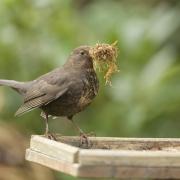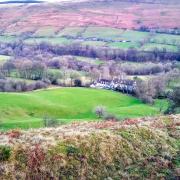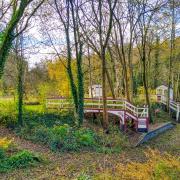The work behind the scenes to ensure there is no final curtain,

Just because the doors of Derby Theatre are closed to the public doesn’t mean that behind the scenes there isn’t a lot of hard work taking place, aimed at keeping the arts community together.
Finding a way through the coronavirus crisis and ensuring there is artistic life beyond it is the central focus for Derby Theatre’s Artistic Director and Chief Executive Sarah Brigham and her team, who may not be staging plays at present but are supporting the community.
The arts organisations in Derby are also supporting each other as they look to find a pathway through these difficult times.
Sarah said: ‘I have online meetings with other theatres, we are there for each other and the Arts Council’s response has been exceptional, they acted quickly and have been really supportive.

‘I have had meetings on Zoom with QUAD and Déda and other local arts organisations, so it does seem like we are all in this together and are willing to help each other find a way through it.
‘We mustn’t forget the independent sector either, freelance artists have seen their income disappear with no Government help until June. Even that won’t help some of our emerging artists, so we’ve been holding advice surgeries, gathering information about the support available, putting together online workshops about managing a crisis and looking after their wellbeing.
‘Our Youth Theatre has moved online and we have been delivering food parcels to young people in care as well, so it does feel like, alongside other venues, we have approached this in a community-focused way.
‘We have furloughed some staff but made a clear decision not to furlough any of our community and learning practitioners or artist development practitioners so they can deliver the support that’s needed.
‘In Abbey Ward, there are 50 young people still going to school and the schools are desperate for something to do with them, so we delivered an Easter project. We are very conscious of our community and civic function. Similarly, for our students, online lectures are still continuing.
‘We are living through unprecedented times and circumstances no-one is used to, so we’re running weekly wellbeing sessions for our staff. Artists and the artistic community are resilient because they are used to that uncertain pattern of life, but our staff and artists are going through all the things everyone is facing and the uncertainty of what things will be like in the future.’
First and foremost, though, Sarah and all at the theatre understand that the health of everyone comes first.
She said: ‘We have to tell ourselves we are incredibly lucky. I’m not putting my life on the line every day like our NHS staff, the people collecting our bins or working in supermarkets. At the moment our focus is on them but eventually society will not be in lockdown and we need to be prepared and ready to help people who have had a tough time through all this, celebrate and get back to normality.’
Life in lockdown means making difficult decisions. The Prime Minister made an announcement on 16 March advising the public not to visit public places like theatres, but did not instruct them to close. Derby Theatre, however, took the decision to shut its doors for the protection of its staff and visitors.
Sarah said: ‘We thought after people had been advised not to go to theatres it would be irresponsible to keep the venue open, so we closed immediately.
‘I was in rehearsal at the time for Treasure Island and our co-production of Crongton Knights was about to open. The set was going in and my phone was buzzing; we knew we had to make the decision straight away.
‘We cancelled all that week’s performances, took the set down and made the decision that Treasure Island wasn’t going to open either. Three members of the cast were already in self isolation at that point, so we already sensed that it was going to be problematic. We sent the cast home, closed the café and just kept the box office open online and on the phone. By the end of that week the staff had gone home, and we had closed the entire building.
‘It all happened really quickly, and our initial thoughts were to make sure our staff were safe, our audiences were safe and that our community still felt connected. For instance, we have one person who comes into our cafe every day and sits and chats with everyone, so we phoned her and let her know we can still talk to her. It was sorting the little things as well as those big decisions that was important.
‘When lockdown happened, it was into budget scenario planning and looking at the furlough arrangements which are incredibly useful, but details didn’t come out immediately.
“I knew we had enough cash in the bank to deal with the permanent staff, but I was worried about the zero hours staff, so we made a commitment straight away to pay them until the end of April. Lots of theatre people across the country were let go with no notice but I felt strongly that they were very much part of our team and we needed to look after them. It felt like a priority and the security of the University of Derby backing us helped us to do that.’
Major shows at Derby Theatre - with scripts, music, sets, costumes and rehearsals all to organise - are planned months in advance, so work had already started on the autumn productions of Lord of the Flies, which Sarah is scheduled to direct, and the Christmas production of Aladdin.
Sarah said: ‘I’ve never been so busy, especially as we don’t know when we can reopen, so it’s a logistical nightmare trying to work out what we can do, when.
‘Our real hope is we are open by July or August and that’s what we are working towards but then you ask questions like ‘Is Lord of the Flies really what audiences want to see when we reopen?’. We are looking at the autumn programme, making sure it’s as secure as it can be or whether to put in alternative plans.
‘When lockdown finishes, we don’t know whether Government will allow mass gatherings and if it does, what size they might be or what audiences’ appetite for going out will be. We are looking at different budget projections and what happens if there is a surge of bookings or, on the other hand, what happens if audiences don’t come back as quickly. It’s a really complex situation, there are so many unknowns.’
Something as far-reaching as this pandemic that has shaken the lives of so many people and which will have a long-lasting impact will inevitably have an effect on writers, artists and performers’ view of the world going forward.
Sarah added: ‘Eventually, there will be a time for reflection about what art we want to make and what we want to say about the world. But there will be a desire not to see 5,000 plays about self-isolating in a room on your own and we also have to remember theatre is there to entertain in times of darkness. Theatre at its best is when it brings people together, when it finds the joy in life as well as moments of reflection and that’s where we are starting to turn our attention to now.’
One thing is certain – Derby Theatre will be back.
Sarah said: ‘Stories have been told through thousands of years, through wars and through huge changes in society, but they have always been there, that is how we have connected to each other; so theatre will survive. It might be slightly different, it may take time to get back to normality but it will survive and we must be sure we take everyone with us and ensure it’s not just people like me at the tip of organisations who are left standing – that includes the artists in the independent sector, those on the fringes, our audiences and our community. That has to be our real purpose.’
Derby’s Lost Boys theatre group, meanwhile, may have put its spring productions on hold, but Director Paul Broesmith believes once the lockdown is over he will have the right shows ready to bring audiences back.
Paul said: ‘We have a lot of respect for companies that have had funding from the Arts Council for very worthy issues that needed tackling from a theatrical point of view, but it might be a tougher challenge for them going forward. The cultural landscape and needs of audiences will be different when this is over.
‘People will want to go out and have a good time. For us, theatre and entertainment is about escapism as much as education and I would say 50 to 70 per cent of our programming is about having a good time; the need for that will be even stronger.
‘Bigger organisations will need to look at their programmes and reignite people’s passions for theatre and show them a good time before then drip feeding the other material back in.
‘People will be fed up of TV and will want to go out. In 2021 we will do even more crowd-pleasing work aimed at giving them a damn good time.’
The Lost Boys had 11 productions for 2020 in preparation at venues like Sudbury Hall, and including ambitious plans for a full season of pub theatre at the Old Bell in Derby, before the coronavirus intervened.
Paul said: ‘We were about two weeks out from doing the first pub theatre production when Co-director Ben Adwick had to go into self-isolation on the advice of 111. The immediacy of it was then brought home and we had to postpone the production.
‘Even before pubs and theatres were closed, I contacted our venues and said we needed to get ahead of this and postpone indefinitely. We did that two or three days before people were advised not to go to pubs and venues and then a few days after that the lockdown was announced.
‘We had already sold a lot of tickets and we were conscious that we couldn’t successfully socially distance the audience from each other and from us as we do intimate work and we are often in amongst the audience.
“I have now worked on three different contingency plans and two have been overtaken by events already; I’m working on a fourth just in case. They are timescale-based, which is why you have to have options. We managed to come through the banking crisis, and we are trying to be philosophical about this.’
The Lost Boys will be short on Government help, however.
Paul said: ‘We don’t operate from a fixed premises so we don’t have a rateable base because we rent space for each production and the £10,000 grant isn’t applicable to us despite the fact that we spend as much on rent as any other small business, albeit piecemeal. The Government response has been great but it’s a gap in the funding support. We are entitled to the 80 per cent furlough scheme which will help but if this goes on for six months what money will we have to seed future productions? We still have operating costs?
‘Luckily, we have always had a contingency pot of money but if it goes on too long the well will be dry.
‘This year was a big gamble year for us, investing in 11 productions. It was a huge undertaking and pub theatre was a big part of it. We were underway with five different productions at different stages of development. We will be postponing them and the hope is they will return but the problem is that we have spent money on them with none coming back in and the longer it goes on the harder it will be to just drop those productions back into the existing schedule.
‘We will change our plans for next year now and will have to look at less risky fair and look to recoup and rebuild.
‘We work with partner venues over a long period of time and it’s a real 50-50 partnership so I have been in conversation with all of them, making sure we are supporting each other and that we are ready to pull the trigger when we can get back to normality.
‘We can’t get in a rehearsal room at present but there are things we have worked on that we can pick back up and get up and running in three months but a lot of effort will be made looking six months ahead, and beyond that, to really get things moving again.’
The Lost Boys have developed a free online creative writing programme to help people through the lockdown. Paul sends out exercises and tasks and anyone is welcome to take part. Email Paul and he will send out the tasks which you can do for fun or return to Paul if you want a critique. It’s a ten-week programme and you can get more details by emailing paul@thelostboys.org.uk



























